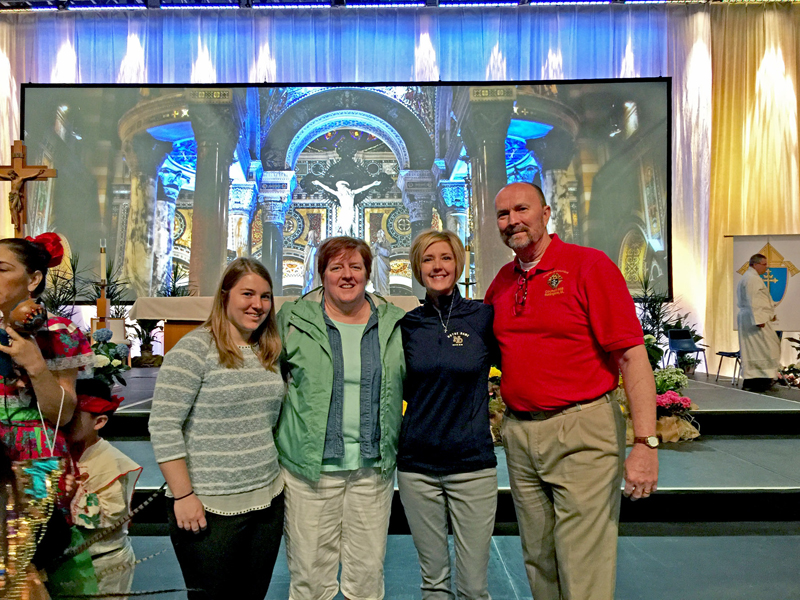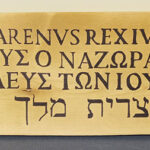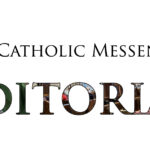By Anne Marie Amacher
The Catholic Messenger
More than 30 educators from Catholic schools in the Diocese of Davenport attended the annual National Catholic Education Association conference to gain new ideas, strategies and ways to grow in their positions. More than 8,000 Catholic educators overall attended the April 18-20 convention in St. Louis.
Here is what several teachers and administrators had to say about the conference.

Burlington Notre Dame Catholic School teachers, from left, Kristine Becks, Nita Carlson, Karen Engberg and Jon Riffel take a break from the National Catholic Education Association conference last month.
Notre Dame Catholic Schools, Burlington
Nita Carlson, religion teacher for grades 6-12, attended the conference to get “rejuvenated.” She especially appreciated sessions on Theology of the Body, instilling faith in athletes and empowering seniors to lead freshmen. Based on what she learned, she “I hope to coordinate a senior advisory for our new freshmen next year. I plan to incorporate Theology of the Body concepts more regularly in all of my classes and I plan to initiate some more faith-based activities with my volleyball players next fall.”
Karen Engberg, fourth-grade teacher, was excited to attend a Catholic/faith-based conference. It was “refreshing to be in the presence of so many other Catholic school teachers. Celebrating Mass to start our day was so special, too,” she said. The first session, “Beyond the Canned Food Drive — Incorporating the Corporal Works of Mercy into Your School’s Daily Life” provided ideas about getting students involved in service projects in the school and community. She hopes to motivate other teachers to get students involved in more service projects.
Prince of Peace Catholic Schools, Clinton
Principal Nancy Peart focused on sessions pertaining to enrollment, marketing, advancement, mission and communication. “The sessions are so jam-packed with information that I will have to go back through my notes to review what I learned.” The session “Maximizing School Marketing Efforts with Limited Resources” offered many ideas about promoting Catholic schools. “There were many great technology ideas… I will be sharing what I learned with my development director to see how we can implement some of the ideas.” She also enjoyed Sister Carol Cimino’s session “Meet the Millennials.” “Sister could do standup comedy.” Her session was “good for the soul.”
John F. Kennedy Catholic School, Davenport
Rachael Whelchel, seventh- and eighth-grade math and social studies teacher, said she attended the conference to get new ideas on teaching methods for math, STEM (science, technology, engineering and mathematics) and social studies. “I was also interested in learning about new materials/resources that were being used to enhance lessons.” A session on coding was of particular interest. The speaker shared “everything from how to begin basic coding concepts to more advanced levels and how he brought it to his school district. I walked away feeling more confident about bringing coding into my classroom.” She said it was “fun to talk to teachers from all over the U.S. and, in some cases, other countries.”
Deneen Woerdehoff, who teaches grades 6-8 resource, Spanish and sixth-grade social studies, attended the conference to gain new ideas and strategies from other professionals who teach in parochial settings. She also appreciated the networking opportunities. The session “Ensuring a Place at the Table: Serving the Exceptional Learners in Catholic Schools” most impressed her. “The quote the professor stated which is still in my mind: ‘You deny the child from the school, you are also denying the family from the church. Remember all are welcomed.’”
Sara Tilkens, physical education teacher and athletic director, thought the conference would be an “interesting adventure” and she was not disappointed. She said a favorite session focused on “Sports and Spirituality 3.0.” The opportunity to meet new people and attend a Mass with so many of them made the experience enjoyable.
Julie Bauer, eighth-grade ELA, social studies and religion teacher, attended the conference to model for her students the importance of lifelong learning. “As the ‘lead’ learner in my classroom, I must model that behavior and share it with my students. Just as there is always something for which one can give thanks, there is always something new to learn.” She appreciated attending a conference tailored to parochial school teachers and administrators. “It was so nice to feel the sense of community among the thousands of attendees. I loved the opportunity to participate in the eucharistic liturgy.”
A presentation on teaching Pope Francis’ apostolic letter “Laudato Si” was “very, very interesting since I had my eighth-graders dive into it last year. Secondly, I attended a session on ‘Teaching Thinking Skills’ taught by a fourth-grade teacher from Finland. Absolutely fascinating how the Finnish education system is so vastly different than ours.”
St. Paul the Apostle Catholic School, Davenport
Patty Handley, who provides academic support, said she especially appreciated being able to attend Mass. A session on “Empathy and Inclusion through Literature” caught her attention. “The presenter began with a slide that said, ‘Everyone you meet is fighting a battle you know nothing about. Be kind. Always.’ I can’t think of a situation where this doesn’t apply.”
Lorene Knobbe, curriculum director, attended a session on Response to Intervention and Multi-Tiered Systems of Support. The session addressed early identification and support of students with learning and behavior needs. The Response to Intervention process begins with high-quality instruction and universal screening of all children in the general education classroom. St. Paul’s has had this process in place for several years now, “primarily for the academic needs of our students. We will use the 2017-18 school year to continue to research behavioral issues and design steps for students with behavioral needs.”
Cathy Hannon, music teacher and school religion coordinator, said NCEA always has new ideas for teaching religion. “Celebrating the Liturgical Year in Your Classroom: Sing a Song of Seasons,” was high on Hannon’s list of favorites. From that session she plans to work with teachers to help students learn more about the liturgical year with new activities and materials. “The liturgical year, which begins the first Sunday of Advent and ends the following year on Christ the King Sunday, does not go along with the school year. It’s important for our students to learn more about the seasons of the liturgical year.”
Principal Julie Delaney said six faculty members were able to attend the conference because of Title IIa funding and the close proximity of the event. “NCEA is the only education conference that is geared specifically for Catholic school educators. Each time I’ve gone I learned valuable information to improve myself and the school in our faith and education. My favorite part of the conference is the liturgies. There is nothing that can compare to about 8,000 voices lifted in prayer and praise.”
She especially appreciated a session on behavior concerns and how to understand a child’s behavior and help the child to be successful. A marketing session provided ideas about how to use social media more efficiently and effectively.
Mary Wilson, a second-grade teacher, said it was fun to see the exhibitors. “I purchased Cam Jansen mystery books and got to have the author autograph them. My second-graders love these stories and love to see the signature of the author.” A session titled “Differentiation Strategies for K-12,” reminded educators that they can work to educate all children with their many differences, Wilson said. “The presenter shared, God gives everyone gifts to share and God gives everyone a cross to bear. If we all had the same gifts, we wouldn’t need each other! Children want their teacher to like them. I must remember, only things that challenge us, cause us to change.”
Tara McCabe, a teacher of seventh- and eighth-grade reading, sixth-grade ELA, and social studies, didn’t want to pass up an opportunity to learn something new. One session that stood out focused on “The Effects of PTSD on Students and What Teachers Can Do.” “Since I’ve had students who have experienced trauma as children, I wanted to know more about it. Here are some of the facts I learned: 68 percent of students have experienced a traumatic event by age 16. PTSD affects a child’s ability to learn by possibly affecting brain development and the ability to think clearly and stay focused. Data suggests every classroom has at least one student affected by trauma. Teachers should view behavior through a trauma lens; this means being curious about why behavior happens, instead of reacting with judgment and punishment. Safe, secure, trusting relationships are key. I really believe that Catholic schools have a unique responsibility to embrace and support children who have experienced trauma. They are vulnerable and we are in a position to help them.”
St. Joseph Catholic School, DeWitt
Principal Sharon Roling cited Jonathan Doyle’s session on “Finding Purpose in the Education Vocation” for personal growth. His talk “inspired me to go deeper in my faith and knowledge so I can better fulfill my vocational ministry within the mission of Catholic education.” R. Mark Beadle and James Horne addressed professional growth in a session titled “10 Actions Catholic Schools are Taking Now to be Flourishing in 2025.” This session “provided me with ideas and resources on how our school and parish stakeholders should begin planning for the future needs of our school.” Roling plans to write up a summary of the sessions she attended and share with the “appropriate stakeholders. We will use this as a springboard for discussion.”
Regina Catholic Schools, Iowa City
Katie Welter, a teacher at Regina Junior/Senior High School, chose to attend to “gain tips, tricks and ideas to execute in my classroom.” She most appreciated the session “Math Rocks.” “This session took two simple manipulative items — dice and playing cards — and showed us different games we can use in the classroom. It included ideas to sharpen order of operations and math facts.”
The conference was a “fantastic experience where I learned a lot and had a great time with co-workers. The association invited many great professionals to speak about what they were passionate about. It will enhance my classroom for sure.”
Seventh-grade teacher Diane Coffin said the conference provided “an excellent opportunity for renewal, a chance to meet with other teachers who experience the same issues I face in the area of Catholic education, a chance to meet with vendors of materials that are specific to Catholic education and, last but not least, a chance to grow as a catechist and learn new and better ways to share our faith and our God with the students.” She singled out a session on morality by Barbara Blackburn. “We must teach our young about morality and how to make moral decisions. My favorite quote from this session was, ‘In every generation, the truth must be opened.’ I find this incredibly profound as a religion teacher for the junior high-age student.” Since returning, Coffin said she has already begun to ask her students questions on morals in which they “really think and reflect about them and then think about the current teachings of the church and what our pope is teaching us. I am impressed with how deeply their reflections have taken the students.”
First-time attendee Tim Scholze, a theology teacher at Regina, wanted to be exposed to new ideas and keep current with educational research. “The one session I attended that really stood out for me was the keynote address on Tuesday afternoon. Jonathan Doyle’s address should inspire all Catholic school teachers and administrators. I highly recommend reading his book, ‘Tools and Fuels: How Catholic Teachers can Become Saints, Beat Burnout, and Save the World.’ He talked about how Catholic teachers are called to do a supernatural task while relying on mostly natural resources, which is not sustainable. He calls for us to become more dependent on God and to let God take control of our lives and schools and only then can we become saints, beat burnout, and help lead our students and each other to heaven. It is powerful stuff.”
Scott Shields, a freshmen/sophomore English teacher, has attended three conventions in his 22 years at Regina. “I always hope to pick up a few new ideas both professionally and personally. More importantly, I get to spend three days on a more personal level with faculty members I rarely have the time to visit with on a regular basis. I actually find that to be the most enjoyable part of the experience.”
The session on “Ancient Faith for the Modern World” dealt with the 12 “articles” of the Apostles’ Creed, “which I found personally very enlightening.” Overall he says he always leaves NCEA with something “very valuable, either personally or professionally, or both.”
Second-grade teacher Joan Ochoa wanted to experience the excitement of Catholic education from thousands of people also excited about it. David Adler, author of the Cam Jansen series, told of his experience as an author, how he stayed home to raise his first son while beginning his writing career. “He was very down to earth and it was obvious that he had a love of writing, family and history, and he combined all that in his books.” Ochoa plans to pass on to her students the enthusiasm she gained from the conference about reading, math and being a Catholic.
Mary Duffey, K-6 technology instructor at Regina Elementary, thought the conference would be a fun way to add to her personal growth goals. “The session on bullying by Jodee Blanco was one of the best sessions I attended.” She said she can take what she learned to help students who are being bullied by using new techniques learned at the conference. She also plans to create a curriculum around the books by David Adler. “The opening liturgy was breathtaking and amazing. The sessions I chose were relevant to my goals. The expo was exciting and fun.”











